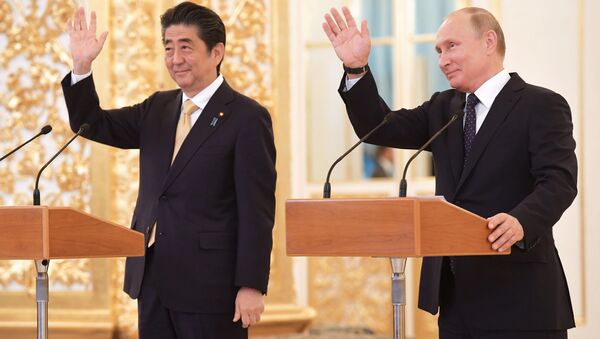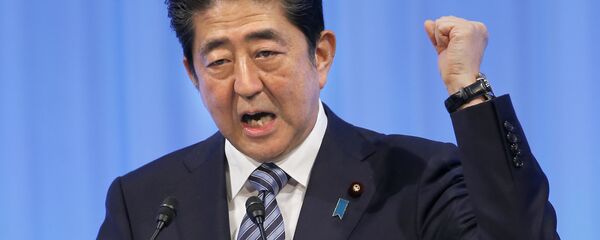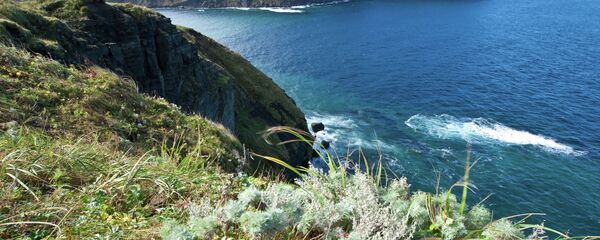On November 14, Russian President Vladimir Putin and Japanese Prime Minister Shinzo Abe met in Singapore and agreed to advance negotiations on a peace treaty based on the 1956 Soviet-Japanese joint declaration, the only document recognized by both countries.
READ MORE: Japan Ready to Continue Efforts on Promoting Economic Ties With Russia
Same day, Putin said that his next meeting with the Japanese prime minister would take place at the G20 summit that will be held on November 30 — December 1. On Wednesday, the Japanese chief cabinet secretary confirmed that Abe would meet with Putin in Argentina. According to Kremlin aide Yury Ushakov, the two leaders will discuss the establishment of а mechanism for negotiations on the Kuril Islands.
Differences and Compromises
The fact that Japan and Russia have never signed a permanent peace treaty after the end of World War II has long been a stumbling block in bilateral relations. The main issue standing in the way of a treaty is an agreement concerning a group of four islands that both countries claim — Iturup, Kunashir, Shikotan and Habomai, collectively referred to as the Southern Kurils by Russia and the Northern Territories by Japan.
READ MORE: Russia, Japan Peace Treaty Talks Require Tokyo's Allied Obligations — Kremlin
On October 19, 1956, Soviet Union and Japan signed the Joint Declaration on ending the state of war and the restoration of diplomatic and consular relations. The Soviet leadership decided to note in the document that in meeting the wishes of Japan and taking into account the interests of the Japanese state, Moscow agrees to transfer the islands of Habomai and Shikotan to Japan, however, the transfer itself was meant to be made after the conclusion of a peace treaty between the parties.
After the conclusion of the Japanese-US security treaty in 1960, which still remains in force and stipulates Washington’s right to place its military bases on Japanese soil, the Soviet Union annulled the commitments made in the 1956 declaration.
Since then talks have been stalling due to the unwillingness of the both sides to compromise — neither on the sovereignty of the disputed islands, nor on the timeline of a possible transfer of the two disputed islets, Habomai and Shikotan. Most lately, during the Eastern Economic Forum in September, Putin proposed to sign a peace treaty without preconditions by the end of 2018, but the Japanese side responded that it would maintain its position that the peace treaty with Russia could be concluded only after the settlement of the Kuril islands dispute.
Abe’s latest announcement about stepping up negotiations with Russia based on the 1956 declaration, under which the transfer of the two islands should take place after signing a peace treaty, might be perceived as his readiness to compromise, Associate Professor and Academic Program Coordinator for International Affairs at the Temple University Japan Campus James D.J. Brown told Sputnik.
'Abe's agreement in Singapore to accelerate peace treaty talks on the basis of the 1956 Joint Declaration does indicate a new willing to compromise. This is because the 1956 Joint Declaration makes no mention of the larger two islands of Iturup and Kunashir (Etorofu and Kunashiri in Japanese). It is also notable that Abe has stopped making public demands for the return of four islands. He therefore seems to have given up all hope of all four islands ever being returned to Japanese sovereignty,' Brown said.
According to the expert, Abe might be now pursuing the so-called 'two plus alpha' option.
'This means that Abe is seeking the transfer of Shikotan and Habomai to Japanese sovereignty after the signature of a peace treaty. In addition, while Iturup and Kunashir would remain under Russian sovereignty, Japan is seeking agreement on a special system of visa-free access and joint economic projects on these two islands (this is the 'alpha'),' Brown said.
Valery Kistanov, the head of the Center for Japanese Studies at the Institute of Far Eastern Studies of the Russian Academy of Sciences, argued in his comments to Sputnik that Tokyo’s overall position on the issue had not changed.
'"I believe that the Japanese position has not changed fundamentally … Having confirmed the validity of the 1956 declaration in Singapore, Shinzo Abe has taken a more flexible position saying that Japan agreed to receive these two islands, sign a peace treaty and then continue negotiations on the territorial sovereignty of the remaining two islands — Kunashir and Iturup. In other words, they have not abandoned their ultimate goals and hopes to receive all four islands, including the two biggest ones', Kistanov explained.
According to the expert, Russia would not make any further concessions as well.
'We will not agree with this, as we believe that the issue should be settled on the basis of this declaration, we want to make it a closure signing a peace treaty and transferring the two islands', he said.
Lacking Public Support and Time
The negotiating process is also complicated by the fact that not only politicians, but common citizens as well are reluctant to make any concessions on the issue.
The overwhelming majority of Russian population has been historically strongly rejecting the idea of transferring the disputed territories to Japan, even though the 2016 opinion survey conducted by the Russian Public Opinion Research Center showed differences in views on the approaches to resolve the disagreements with Tokyo. According to the poll results, 53 percent of respondents insisted that the disputed islands belonged and would belong only to Russia, while 42 percent expressed support for continuing negotiations and need for a mutual agreement on the issue.
READ MORE: Russia, Japan Launch Joint Naval Drills in Gulf of Aden — Military
Besides, the clock is ticking for both leaders, since Abe’s third and last term as the head of the ruling Liberal Democratic Party (LDP) ends in 2021, whereas Putin cannot run for reelection in 2024 under the constitution after securing the second consecutive six-year term in March presidential vote.
According to Kistanov, Abe is unlikely to gain enough support for signing a peace treaty before the end of his tenure as the country’s prime minister.
'I think that this is extremely unlikely, because even if Shinzo Abe himself will go for it, then it will be necessary to get the parliament’s approval, and the parliament will not go for it', he said.
Brown echoed the doubts about the possibility of solving the decades-long dispute in the near future given remaining differences.
'Overall, it remains unlikely that a peace treaty will be signed before the end of Abe's last term as prime minister, which ends (at the latest) in 2021 … With this gap between the Japanese and Russian positions unlikely to be bridged, it seems unlikely that the dispute can be resolved in the foreseeable future', Brown said.
Their skepticism, however, was not shared by Kazuhiko Togo, a retired Japanese diplomat and the director of the Institute for World Affairs at Kyoto Sangyo University.
'I think that it is completely possible to sign the peace treaty and ratify it by both countries if the countries put maximum efforts in negotiations from now on', he told Sputnik.
In particular, the expert urged the Japanese government to make its position on the ongoing talks more explicit.
'It is necessary for prime minister Abe to show people "big direction" – in which direction he will make take steps to sign the peace treaty. On the other hand, negotiations face a number of complicated and delicate problems, and it is not possible to make everything public at this point. I think the most important thing is to balance the guidance on "big direction" with what should be seriously discussed only among negotiating parties. In this sense, the phrase ‘accelerate peace treaty negotiations based on the 1956 declaration’ [said by Abe] after the Singapore summit is a courageous remark, given that it is his first appeal to the nation about this', Togo noted.
Possible US Military Presence
Abe has reportedly assured Putin that Japan would not allow US military bases on the islands, but Tokyo’s ability to provide feasible guarantees is questionable, Kistanov noted.
'I think that the issue of the US military bases on these islands may bring the entire negotiations to a stalemate … Japan cannot give any serious guarantees. Abe said that he would raise the question that there were no military bases there, but this oral statement is not enough. We have already received such assurances from Western European states when they promised us that NATO would not expand to the east after the dissolution of the Warsaw Pact, but now we see them near our borders in the Baltic States, in Ukraine, and will soon see in Georgia', he said.
The expert noted that Moscow’s concerns could be sufficiently resolved only by "a serious written document" guaranteeing that no US military bases would be set up on Habomai and Shikotan, which is very unlikely to be welcomed by the United States. In particular, Washington may even blackmail Tokyo by saying that it would not come to the rescue if Beijing tries to seize the disputed Senkaku Islands, he pointed out.
'Japan, I think, will not receive such a document from the United States, because otherwise the United States will tell Japan — well, if you want to limit our treaty to all other territories except the Southern Kuril Islands, then protect yourself from Chinese expansion, possible attempts of forceful takeover of the Senkaku Islands', Kistanov explained.
Brown, on the other hand, highlighted that the US-Japan Security Treaty did not grant Washington rights to deploy its troops everywhere in Japan, as it should first consult with the Japanese authorities and receive their approval.
'The Abe government may therefore hope that they can satisfy Russia's concerns by giving assurances that they will not permit US facilities to be placed on the transferred islands. These assurances, however, are unlikely to be sufficient for the Russian side, who may insist that the transferred islands remain permanently outside of the application of the US-Japan Security Treaty. This would mean, not only that no US facilities would be permitted upon this territory, but also that the US would not have a treaty commitment to defend these islands if they were to be attacked', the expert said.
Brown noted, however, that the issue of the US military bases is "as serious as it may at first appear."
'This is because the US military would be unlikely to have much interest in installing a military facility on Shikotan or Habomai. The United States already has the option of developing military facilities on the shore of the Sea of Okhotsk and very close to the disputed islands. However, the US has never chosen to develop military facilities anywhere within Hokkaido. This would be unlikely to change even after the transfer of territory', Brown stressed.
READ MORE: Abe Tells UN General Assembly Japan, Russia Must Resolve Territorial Issue
Togo, on the other hand, argued that the possible US military presence was not even an issue, since the deployment of US troops on the territories was 'impossible'.
"For a long time, I have not understood the meaning of the debate reported by media about the connection between a peace treaty and the Japan-US Security Treaty … I think that it is impossible for the United States to demand such a step, based on either the Japan-US Security Treaty or its spirit. In the unlikely event that US officials have such intentions, Japan can just explain properly that it would not do such thing, and I am convinced that that there are any grounds that Japan would have no chance but follows such a request of the United States under the security treaty," he said.
The Japanese expert also pointed out that Tokyo would find ways to provide solid assurances to the Russian side.
'If Russia is really concerned about this, I think that Japan’s negotiators are doing their utmost to resolve it, and I believe that there are various insights on how to provide such security assurances formally', Togo stressed.
Putin and Abe meet more frequently than other world leaders, with the upcoming talks on the G20 sidelines becoming their 24th meeting. Besides, Abe announced earlier in November that he would visit Russia in early 2019. The Kyodo news agency later reported citing sources that the visit would take place in late January.
The views and opinions expressed by the contributors do not necessarily reflect those of Sputnik.



